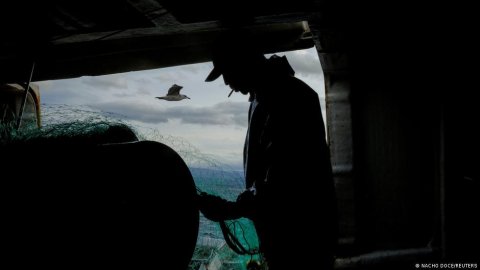Spain’s fishing industry can barely survive without foreign workers. But the uncertainty has people working in tough industries looking at alternatives.
Photo 1: Bitter memories
For Senegalese fisherman Babou Diouf, hearing about migrants arriving in the Canary Islands by raft is difficult. It reminds him of the dangerous and arduous journey he took 17 years ago across the Mediterranean, eventually arriving at the fishing port of Brera on Spain’s north coast.
Photo 2: Uncertain outlook
Thanks to Diouf’s fishing skills, he was able to secure a new life in Spain. Spain has the largest fishing fleet in the European Union. However, fewer and fewer Spaniards want to work in the industry, increasing the reliance on foreign workers.
Photo 3: Multicultural crew
About seven out of 10 crew members on the Brera fishing fleet are foreign workers, said Juan Carlos Otero of the Brera Shipowners Association. The fishing village of Brera is home to approximately 9,450 residents from 44 countries. 90 of the men were from Senegal and 244 from Cape Verde.
Photo 4: Struggle to survive
But despite foreign workers, Spain’s fishing industry is struggling to survive. Experts have warned that Brera, where half of its fleet engages in longline fishing, could go bankrupt within three years as a result of the EU’s ban on bottom trawling.
Photo 5: “I sleep when I can, not when I want to”
Diouf works on the Salidar River with other Senegalese, Spaniards and Indonesians. Working in 14-hour shifts, the hake pulls up the nets, cleans the catch, and packs it into boxes. “It’s been like that all my life,” Diouf said. “I sleep when I can, not when I want to.”
Photo 6: Tight situation
The ship is very crowded. Captain Francisco González García said Spain’s fishing industry could not survive without foreign workers. “There are very few young Spaniards, so the future lies in the training of immigrants,” he explained.
Photo 7: A well-earned break
It’s time for a coffee break for Indonesian longline fishermen. Their skills are so coveted that boat owners sometimes pay for their flights to Spain. Some people have to find work through word of mouth, while others, if they have a residence permit, have to go to the docks to find work to see if they can get a contract.
Photo 8: Preparing for the future
Diouf is satisfied with his income, which allows him to pay rent, support his family, and send money to his older children in Senegal. But he’s also training to use a chainsaw, mower and drive a truck in preparation for his post-fishing career.
Author: Claudia Dehn, Reuters
First publication date: February 11, 2024
Copyright DW – All rights reserved
DW is not responsible for the content of external websites
sauce: dw.com
